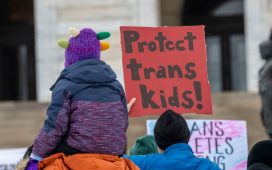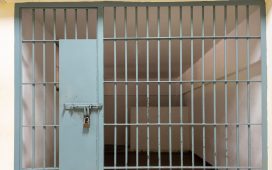One day, shortly after Russia’s invasion of Ukraine, a seventeen-year-old named Tymur Sabri was visiting his grandmother in a village outside of Kyiv. Tymur is lanky—he loves to play basketball—with messy hair and a deep voice. Before the war, he lived in Kyiv with his parents and an older brother. His sister Karina, her husband, and their dog, Diamond, lived nearby. In school, he excelled at math and physics, and, like his siblings, he played the piano. His mother, Svitlana, is a professional accompanist. “I was born in Kyiv, and we had everything there,” he told me recently. That afternoon, however, when rockets landed near his grandmother’s house during their visit, the family decided it was time to go. “We picked up our things and just left,” Tymur said.
It took them three days to get out of the country. The group fleeing included Tymur’s mother and sister, his cousin, and two aunts—“all the women of our family,” Tymur’s sister told me. Ukrainian law prevents men between the ages of eighteen and sixty from leaving the country, so Tymur’s father, who is fifty-three, and his brother Arthur, who is twenty-three, stayed behind; Tymur was suddenly the only male in the group. They took a train to Lviv, in the west of Ukraine, about forty miles from the Polish border. They travelled light, each carrying a backpack filled with warm clothing; the temperature was below freezing at times. In Lviv, they paid a man to drive them to the border and walked the remaining distance on foot. In Poland, they took a series of buses to Warsaw, where, through Karina’s husband’s work, they secured free accommodation in a hotel by the airport. The first time they heard the planes taking off, they were startled by the noise. “It’s unusual to us that planes can fly during a peaceful time, with a peaceful purpose,” Tymur told me.
They stayed at the hotel near the airport in Warsaw for more than a month, until they learned that their free housing was coming to an end. Tymur’s cousin and aunts decided to stay in Poland, and Karina, a photographer, went to Paris, where she found a temporary job. Tymur and his mother considered their options. Unlike some of his family members, Tymur’s English was very good, and he wanted to complete his education in an English-speaking country. Online, he read about a British visa program called Homes for Ukraine, in which U.K. residents could sponsor individuals or families by agreeing to host them for at least six months in their houses. People were offering spare rooms, or sometimes a whole floor, but the process was onerous. Sponsors had to name a specific Ukrainian and fill out an extensive application.
On Facebook, Tymur posted his family’s story. He wrote that he wanted to be a musician, that he spoke English, and that he was looking for a place for himself and his mother, who wanted to continue working as an accompanist. He was surprised by how many people responded. “It was really good,” he said. Tymur sorted through the many responses, translating them for his mother. “You need to look through a few people to make your choice, so you won’t be disappointed,” he told me. One woman wrote to him that she had a friend in London named Louise Kaye who was interested in providing accommodation for people connected to the arts. Tymur wrote to Kaye, “explaining who I am.” They exchanged notes a few more times and had a video call. “Then she was, like, ‘O.K., I think I can do it.’ ”
In “Exit West,” Mohsin Hamid’s fantastical novel from 2017, a series of magical doorways leading to other countries suddenly appear. “Rumors had begun to circulate of doors that could take you elsewhere,” Hamid writes. You step through a darkened portal in one location and emerge somewhere else. For some Ukrainians, the effect of the U.K.’s visa scheme has not been entirely dissimilar. In March, when the government announced the program, more than a hundred thousand members of the British public registered their interest. Shortly afterward, the first successful applicants began to arrive from Ukraine, settling, amid the paperwork and upheaval, into a new life. For many, the experience has been surreal and unexpected, like slipping through a darkened door.
Louise Kaye lives on a pretty, tree-lined street in Chiswick, in West London, one of the city’s wealthier neighborhoods. Her house is red brick, with whitewashed windows crossed at points with vines, surrounded by a picket fence and mature trees. Inside, there are several bedrooms, a painting studio (Kaye is a painter), crammed bookshelves under the stairs, and an airy dining room with views onto the garden. In the living room, the walls are pale turquoise and hung with oil paintings. There’s an Eames chair, a concert harp, and a grand piano. On the top floor, there’s a set of self-contained rooms, often occupied by guests: a bathroom, a sitting area, and a tiny but functional kitchenette.
Kaye moved into the house in the nineteen-nineties with her husband, David, and their two young daughters. David came from a wealthy manufacturing family; Kaye had studied art restoration and was preparing for a job in Italy when they met, at a concert at the Royal Festival Hall. Instead of moving to Italy, Kaye married David, who eventually took over his family’s business. Kaye ran a marketing company for a time, and then devoted herself to volunteer work. She worked for a citizens’ advice bureau, taught adult literacy, and became a magistrate. She and David set up a youth community center on a housing estate, and put on fund-raising dinners and intimate concerts at their home. There were always people staying in the house, usually young friends or musicians who needed a place to stay while performing. A pianist, an expert on opera, stayed rent-free for fifteen years.
In 2019, the couple began talking about hosting a Syrian refugee, and contacted the nonprofit Refugees at Home. The opera expert had departed, and the top floor was free. But, in August of that year, David was admitted to the hospital, and he died five weeks later. Kaye didn’t think she could do it alone, though she felt like she was “rattling around in an empty house.” She took long walks in the park with her elderly rescue dog, Sadie. She started a new relationship with a woman named Clare, a retired psychotherapist who loved to swim. When the war in Ukraine began, Kaye called Refugees at Home and told them she was ready. She felt a personal connection to Ukraine because her Jewish great-grandfather had been forced out of Odessa during the pogroms in the early part of the twentieth century. “There were many Jews at that time who fled that part of the world,” she said.
When Kaye learned about Tymur’s Facebook post, she placed a call with Tymur and Svitlana—she wanted to make sure they were comfortable with her relationship with Clare—and then filled out the paperwork and referred them to Refugees at Home. She planned to give Tymur the bedroom upstairs—“So he can study and have privacy, which I think a teen-age boy needs”—and his mother the adjoining living area, which has a pullout bed. She filled the kitchenette with basics: “Rice and pasta, and a tin of tomatoes.” She wanted them to be able to cook whatever they liked.
Tymur and Svitlana took a train from Warsaw to Paris and stayed with Karina for a few days. Tymur wasn’t a huge fan of the city. “I have some experience now, living in Warsaw, living in Paris, and I can tell you for sure that Kyiv for me is the best option,” he told me, before leaving Paris. “I haven’t seen London yet,” he added, but “my opinion won’t change.” He and his mother boarded the Eurostar—free for Ukrainians—and then took the Tube to Chiswick. They arrived with a few bags of luggage, and a box of cakes for Kaye. They all went into the garden and had a cup of tea.
Since March, some eighty-six thousand Ukrainians have resettled in the U.K. under either the Homes for Ukraine scheme or a related program for Ukrainians with family already living in the country. When considered next to the total number of Ukrainian refugees across Europe—5.5 million, according to the U.N. Refugee Agency—it’s a drop in the bucket. Other countries, in the European Union, are doing much more. Germany has welcomed more than eight hundred thousand; Poland, nearly 1.2 million. (The United States, by comparison, has committed to accepting up to a hundred thousand.) Renae Mann, the executive director of services at the British nonprofit Refugee Council, told me that the Ukrainians arriving in the U.K. tend to be people with children, mostly women, or skilled professionals with a bit of money to travel. The U.K. government will not pay for the journey out of Ukraine, so there’s a “degree of social capital that people need to be able to get here in the first place,” Mann said.
At a pub one day, I met Yana, a twenty-seven-year-old from Kyiv who had just moved to Hackney, in East London. She had been living with her parents and working at a bank when the war broke out. Lying in bed one night, she heard a sound like fireworks coming from outside her window, and realized it was a bombing. She and her parents spent five days in a bomb shelter before returning to their high-rise, where they covered the windows and huddled in the bathroom for safety. She read about the U.K.’s visa program online and decided to apply. Her parents did not want to leave their home—they decided to stay—but Yana wanted to get as far away as possible. “Immediately, I said, ‘O.K., what do I need to do?’ ” she told me.
Online, she connected with Alex Ward, a thirty-four-year-old Brit who worked at a utilities company. He wrote that he was gay, had a cat, and lived in a small two-bedroom flat that he was happy to share. Ward was recently separated from a Russian ex-husband who was born in Ukraine. When the war broke out, Ward “was sitting at home, feeling shit,” he told me. When he heard about the visa scheme, he thought, “I’ve got to do it, I’ve got to do something.” Yana travelled to Poland on an evening train packed with women and children. The lights had been cut for security, and she sat alone in the dark, thinking of her family. Ward connected her with a colleague there, and she stayed for several weeks before travelling on to the U.K.








